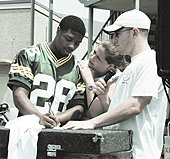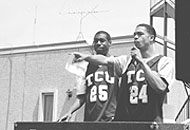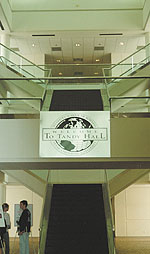By Kasey Feldman staff reporter Although it is over a thousand miles from the World Bank demonstrations in Washington, D.C., the makeshift shack on the lawn beside Brite Divinity School stands in protest of what some claim to be the negative effects of globalization. The shack, made of old pallets, corrugated metal and plastic tarps, is a replica of those Brite students saw on a class trip to a shanty-town in Mexico just across the border from Brownsville, Texas. The students viewed living and working conditions there as part of a one credit-hour course over Spring Break. The students built it as part of efforts to raise awareness about the effects of globalization. Peter Jones, a Brite student who helped build the shack, said the problem with globalization is the lack of international regulation. He said companies can locate where the labor is cheapest and do not have to provide fair wages or decent working conditions for their employees. Edward McNertney, chairman of the economics department, said globalization is not perfect, but it does have its advantages. "The advantages of trading across borders are that it allows companies to specialize in the one thing they do best, and it allows each of us to have more and better products," he said. "I don't know the exact rules of the World Trade Organization, but there is no question that environmental rules, safety standards and child labor laws are different in different countries. And companies outside the U.S. don't have to comply with U.S. regulations." Robert Garnett, an instructor of economics, called the economic environment created by current world trade policies a "race to the bottom." "We're creating this world trade system that encourages reductions in standards rather than increases," he said. Daisy Machado, who led the class in Mexico, said at the Adidas plant near the shanty town, each worker sews 508 shoes a day for a salary of $36 a week. "Their homes look much like the one we built, made out of scrap material with dirt floors and no bed," Jones said. "A family of five will all sleep on the floor together. The shacks are built on top of the town dump, and the children and pigs dig around in the trash for food." Machado said one of the requirements of the course is for the students to do something publicly to show their feelings about the things they saw. "The students are trying to bear witness to the social injustice," she said. "This is Holy Week and these issues have a lot of significance regarding what it means when we say we are Christians. That requires certain responsibilities." Machado said one of those responsibilities is to make people aware of injustices so something can be done about them. Jones and two other Brite students, Boyd Hunt and Niki Jorgenson, are giving a presentation about globalization with slides from their trip at noon Thursday in Weatherly Hall in the basement of Brite. The presentation will be followed by a communion service at the shack. The presentation and communion service are open to everyone.
Kasey Feldman
By Jeff Anderson staff reporter
Topher said he had the most fun at the relay race at Clifton and Sheridan Morris Practice Fields near Amon Carter Stadium. "I liked the track," he said. "It's good exercise and flexes your legs." Jill Johnson, a junior social work major and School Is Cool Jam coordinator, said about 300 children from Daggett, DeZavala and Lily B. Clayton elementary schools participated in Tuesday's event. "We want to show them that school is fun, exciting and rewarding," Johnson said. "A lot of kids drop out of school between sixth and eighth grade, and we want them to stay in school." The School Is Cool Jam is put on by social work students from the Generalist Practice With Communities and Organizations class. The class is taught by department chairwoman Linda Moore. The TCU Athletics Department teamed up with social work students and staffed many of the events. Johnson said more than 300 people volunteered time to help children participate in the activities at the practice fields. Some of the activities included relay races, basketball, a dunk tank and face painting. Marcy Girton, associate athletic director, said it is great for the athletics department to have an opportunity to give back to the community. Several athletes and coaches participated in the events throughout the day. "The athletes are talking to kids as they come through (activities) about the importance of staying in school," Girton said. "It's neat for kids to see athletes in their uniforms." Yolanda Matos, a Daggett fifth-grade teacher, said her students have been excited for almost two weeks. The interaction between children from other schools is great, she said.
"The best subject is math," he said. "Math revolves around everything. I use math in volleyball because you have to have your arm at a certain degree to hit the ball." Layne Trent, a Lily B. Clayton teacher, said it will be good for the children to remember their day at TCU. "Maybe in six or seven years they will want to be a part of TCU," Trent said. Johnson said after all of the events, pizza was served for lunch. Also, former TCU football player and current Green Bay Packers running back Basil Mitchell spoke to the children about staying in school. Other athletes spoke and signed autographs too, she said. Johnson said she has spent the last four months preparing for the event. "I loved doing this," Johnson said.
Jeff Anderson
By Kaitie Smith staff reporter The House of Student Representatives voted Tuesday to amend the Student Government Association Constitution bylaws after a lengthy debate. "As it stands now, the House is made up of seven committees," Vice President Sara Donaldson said. "We decided that by consolidating some of them, we could be more productive and efficient." Members voted to remove the Technology Advancement, Dining Services, Student Concerns and University Relations committees. "Many current members of the Technology Advancement committee felt that there was not enough to do," Donaldson said. "So we combined Technology Advancement with the Dining Services committee to form University Affairs." Some members were opposed to this change, Town Representative James Applebury said. "I think the Dining Services committee does a lot more than people realize," Applebury said. "They hire speakers for The Main and go to other schools to compare food prices and do surveys on food staff. Food is a common issue because everyone has to eat. Just because one committee does not have enough to do doesn't mean you should eliminate a whole service committee." Scott McCray, Pete Wright representative, said he felt the change would be positive. "What I did not hear was that Dining Services will no longer be dealt with by House," McCray said. "People are worried, but all the dining concerns will definitely be handled." Residential Concerns and Student Concerns will now be temporary ad hoc subcommittees underneath the new title of University Affairs, Donaldson said. In other House business, Chancellor Michael Ferrari announced his agenda for the future. "This has been an outstanding year to be a student leader at TCU," Ferrari said. "My main agenda is deciding where TCU is headed in the near future." Ferarri said this year's biggest accomplishment is the formation of the Commission on the Future of TCU. "The Commission is made up of 450 members, half of which are alums," Ferrari said. "Each member will be required to submit a list of recommendations of improvements. In June, a committee will make a prioritized list determining which need is most urgent." Ferrari also discussed the new addition of the Tucker Technology Center. "The new technology center costs $25 million and is the single most expensive project TCU has ever encountered," Ferrari said. "We hope to break ground over the summer and have it completed by January 2001."
Kaitie Smith
By Yonina Robinson staff reporter After his $6 million gift to the M.J. Neeley School of Business, James A. Ryffel said the entrepreneurial center which bears his name - and its $1 million venture capital fund - will help propel the school to the top ranks of American business schools. "TCU is the first school to offer an entrepreneurial program as an undergraduate course with a venture capital study program that uses real money," Ryffel said. "So someone will be in the school and learn how to raise money, do business plans and strategize a business." David Minor, director of the James A. Ryffel Entrepreneurial Center, said although the goals of the center are firm, the specifics are still unclear. "We want to create a high-quality entrepreneurship education for the students at TCU and for the Dallas/Fort Worth entrepreneurial community that both develops and supports their entrepreneurial activities," Minor said. "But it is way too soon to give credible answers. It is kind of a work in progress."
William C. Moncrief, interim dean of the business school, said the entrepreneurial center and venture capital fund will be student-run. "The control of the program is going to be inside and that will come from the center itself," Moncrief said. "But obviously, we're thrilled to have (Ryffel's) participation in the program. And we'll keep him informed of what's going on, but it's an academic program." Ryffel said although he does not want to be solely involved with the project, he wants to help supervise it. "I plan on being a trustee on the board who oversees the program," Ryffel said. "I don't plan on having control. I want to be available and accessible to students." Ryffel said he would like to see the school stay on the cutting edge of entrepreneurial studies as they relate to technology because that is the future of business. "Every business is going to have to relate to technology and how it operates and does its business and processes information," Ryffel said. "That process is going to have to be integrated into entrepreneurial teaching. I'd like to be involved in steering the program into that." Moncrief said the program will be a mixture of undergraduate and graduate students. They will have to have specific courses to get in, so realistically the participants will be seniors. Ryffel and his wife, Linda, donated $6 million to the business school on March 22. The entrepreneurial center will receive $5 million and venture capital will receive the other $1 million.
Yonina Robinson
By Natascha Terc staff reporter A $1.5 million endowment from an anonymous donor will fund a special program at TCU for children with Down syndrome. The Rise School of Fort Worth, modeled after three others in Tuscaloosa, Ala., Dallas and Houston, will be a year-round program focused on the specialized needs of children with Down syndrome. Two classrooms in the Starpoint School, 2829 Stadium Drive, will be provided for 20 children between the ages of 18 months to 5 years, said Kathleen Cooter, principal of the Starpoint School. Tuition will be approximately $8,000 per year, and classes will start Sept. 5. Cooter said the school will emphasize speech, occupational, physical and music therapy for the students. The anonymous donor has a close relationship with a Down syndrome child, Cooter said. The endowment will offer opportunities to other children with learning disabilities as well as TCU students. "The endowment put together a plan of action to make the Rise school a program of TCU," Cooter said. "Rise will do as much or more (as the Starpoint School) with offering learning opportunities to students on campus." Students majoring in education, social work, speech communication and many other areas will benefit from the interaction with Down syndrome children on campus, said Cornell Thomas, special assistant to the chancellor for diversity and community. "It is very exciting because of the potential for TCU students to widen their perspective about differences," Thomas said. "If students understand what Down syndrome means and the capabilities associated (with it), they will be more likely to hire those individuals in the (work force)." Nancy Meadows, associate professor of special education, said having the school on campus will give TCU students a chance to observe and work with children. "I'm excited because (the Rise School) gives TCU students majoring in early childhood and special education opportunities to work with young children on campus," Meadows said. "We don't get many opportunities like this." Liz Louden, a graduate student in early childhood education, said she is glad to see TCU valuing young children and their education. "I think it's wonderful that TCU is offering a place for something like this," Louden said. "Otherwise these Down syndrome kids wouldn't have the opportunity for preschool. It's a great way for TCU to get an education major involved and also to give back to the community." Thomas said a group of families has already begun fund raising to meet its goal of building a Rise School on campus. "TCU is not in a position to be financially liable at any time," Thomas said. "Yet we will reap the benefits of having (the Rise School) on campus to serve kids and bringing recognition to the university." Cooter said TCU's main contribution is the facility on campus and the services associated with the upkeep. "The part of Rise School that must be acknowledged is that TCU is doing good for the community," she said. "TCU will end up doing some fund raising, but the goal is that the Rise School become self-sufficient." Katie Kirkpatrick, a junior special education major, said she hopes to work at the Rise School in the fall. "I'm thrilled beyond belief because I want to teach specifically Down syndrome children," Kirkpatrick said. "I'm so excited; the children are going to be precious."
Natascha Terc |
| The TCU Daily Skiff © 1998, 1999 Credits |
 School is cool. Especially when you get
to have fun, exercise and interact with other students, said Chris Topher,
an 11-year-old E.M. Daggett Elementary School student and School is
Cool Jam participant.
School is cool. Especially when you get
to have fun, exercise and interact with other students, said Chris Topher,
an 11-year-old E.M. Daggett Elementary School student and School is
Cool Jam participant. Topher said the School Is Cool Jam was fun
but he likes school just as much.
Topher said the School Is Cool Jam was fun
but he likes school just as much.  However, Ryffel said with the venture capital,
students will learn how to read a business plan, how to review some of
the proposals and how to evaluate them in the marketplace.
However, Ryffel said with the venture capital,
students will learn how to read a business plan, how to review some of
the proposals and how to evaluate them in the marketplace.